| Listing 1 - 10 of 21 | << page >> |
Sort by
|
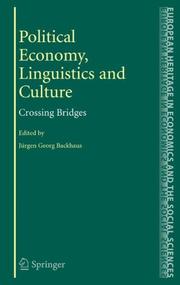
ISBN: 1281148113 9786611148119 0387733728 038773371X 1441944613 Year: 2008 Volume: v. 5 Publisher: New York : Springer,
Abstract | Keywords | Export | Availability | Bookmark
 Loading...
Loading...Choose an application
- Reference Manager
- EndNote
- RefWorks (Direct export to RefWorks)
During the late 19th and throughout the 20th century, social sciences in general and economics in particular have undergone enormous progress. This has led to something of an embarrassment of riches. While certain topics have been fully researched to the point where the marginal benefit from further research is approaching zero, others have remained largely under-researched or were being ignored altogether. It is this discrepancy which prompted the research paradigm of “Crossing Bridges”. For this volume, ten authors have joined forces to address the problem of under-researched topics, focussing in particular on gaps in interdisciplinary research between economics and other social sciences such as linguistics, art and cultural history. Making use of interdisciplinary methods and approaches, the book makes a case for stronger bonds between the different fields of social science.
Economics --- Social sciences --- Language and culture. --- Information society --- Philosophy. --- Research. --- Political aspects. --- Culture and language --- Culture --- Social philosophy --- Social theory --- Economic history. --- Economic policy. --- Political science. --- History of Economic Thought/Methodology. --- Economic Policy. --- Linguistics, general. --- Methodology of the Social Sciences. --- Sociology, general. --- Political Science. --- Methodology. --- Administration --- Civil government --- Commonwealth, The --- Government --- Political theory --- Political thought --- Politics --- Science, Political --- State, The --- Economic nationalism --- Economic planning --- National planning --- State planning --- Planning --- National security --- Social policy --- Economic conditions --- History, Economic --- Linguistics. --- Social sciences. --- Sociology. --- Linguistic science --- Science of language --- Language and languages --- Behavioral sciences --- Human sciences --- Sciences, Social --- Social science --- Social studies --- Civilization
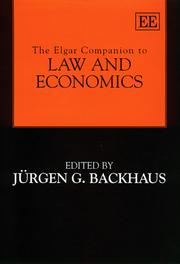
ISBN: 1858985161 9781858985169 Year: 1999 Publisher: Cheltenham (UK): Elgar,
Abstract | Keywords | Export | Availability | Bookmark
 Loading...
Loading...Choose an application
- Reference Manager
- EndNote
- RefWorks (Direct export to RefWorks)
Economic analysis of law --- Law and economics --- Law and economics. --- AA / International- internationaal --- 347.70 --- Handelsrecht: algemene werken en handboeken. --- Economics and jurisprudence --- Economics and law --- Jurisprudence and economics --- Economics --- Jurisprudence --- Handelsrecht: algemene werken en handboeken
Book
ISBN: 9783631615225 3631615221 9783653029055 3653029058 Year: 2013 Volume: 5 Publisher: Frankfurt am Main: Peter Lang,
Abstract | Keywords | Export | Availability | Bookmark
 Loading...
Loading...Choose an application
- Reference Manager
- EndNote
- RefWorks (Direct export to RefWorks)
The issue whether fiscal sociology is ripe for an encyclopedia is the hidden agenda of this project. The authors are international experts from the old and the new world, from Italy to Estonia, the Netherlands to Russia, and of course, the United States. The essays cover both, the history of fiscal sociology and recent and future issues, such as the making of the Estonian constitution, which emphasizes fiscal austerity, and the emerging European constitution.
Economics --- Finance, Public --- Political sociology --- Economie politique --- Finances publiques --- Sociologie politique --- Sociological aspects --- Social aspects --- Aspect sociologique --- Aspect social --- --Politique fiscale --- --Sociological aspects --- Economics -- Sociological aspects. --- Finance, Public -- Social aspects. --- Political sociology. --- Sociology & Social History --- Social Sciences --- Social Change --- Sociological aspects. --- Social aspects. --- Economics - Sociological aspects --- Finance, Public - Social aspects --- Politique fiscale
Book
ISBN: 1441974962 1441974970 Year: 2011 Publisher: New York : Springer,
Abstract | Keywords | Export | Availability | Bookmark
 Loading...
Loading...Choose an application
- Reference Manager
- EndNote
- RefWorks (Direct export to RefWorks)
Physiocracy, or the economic theory that a nation’s wealth comes from is agricultural and land development, was a popular school of thought in France in the 18th century. It was short-lived and it did not take long for the counter position, called Antiphysiocracy, to succeed it. Antiphysiokrat (1780) by Johann Friederich (von) Pfeiffer (1718-1787) greatly reduced the impact of the movement in Germany. However, Physiocracy did have some long-term effects, which are especially very relevant today and worthy of closer examination. The movement also has gained renewed interest in recent years because of the emphasis on land and the environment. The main consequence of Physiocracy was the development of forestry—the maintenance of forests to ensure sustainability—which would become the first of the applied environmental sciences. The other lasting point of Physiocracy is the idea of a single tax on land—made popular by Henry George in the late 19th century—while Antiphysiocracy has left us with a manifold and complex tax system. The contribution and significance of the Physiocrats and Antiphysiocrats are explored in detail through chapter contributions by economists, philosophers, and social historians. For example, Erik Reinert examines the topic of protective measures and puts it in a broader context in his chapter, which also includes several figures on technological dynamics. This topic is carried further by Sophus Reinert of Cambridge University, who focuses on economic espionage at the time. Enrico Schöbel and Hans Frambach look at the economic policy side of Physiocracy with respect to taxation. Kenneth Carpenter at Harvard shows that it was not the Bible that was the mostly widespread literature in the nineteenth century, as one might expect, but the Pfeiffer-type publications that shaped the knowledge economy. The book concludes that neither the Physiocrats, nor the Antiphysiocrats were pure profit maximizers and that they all had the well-being of the commonwealth in mind. It brings to light previous studies only conducted in German and is the first analysis of Pfeiffer in a century, making the book of interest to any student or scholar of political economy and the history of economic thought.
Comparative economics. --- Economics -- Philosophy. --- Mercantile system. --- Pfeiffer, Johann Friedrich von, -- 1718-1787. --- Physiocrats --- Economics --- Comparative economics --- Business & Economics --- Economic Theory --- Economic History --- History --- Physiocrats. --- Philosophy. --- Pfeiffer, Johann Friedrich von, --- Bodenreform --- Comparative economic systems --- Economics, Comparative --- Von Pfeiffer, Johann Friedrich, --- Political science. --- Economic history. --- Social sciences. --- Economics. --- Methodology/History of Economic Thought. --- Political Science. --- Social Sciences, general. --- Economists --- Economic policy --- History of Economic Thought/Methodology. --- Behavioral sciences --- Human sciences --- Sciences, Social --- Social science --- Social studies --- Civilization --- Administration --- Civil government --- Commonwealth, The --- Government --- Political theory --- Political thought --- Politics --- Science, Political --- Social sciences --- State, The --- Economic conditions --- History, Economic
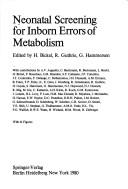
ISBN: 0387097791 0387097783 1441935355 9786611875756 1281875759 Year: 2009 Publisher: New York, NY : Springer,
Abstract | Keywords | Export | Availability | Bookmark
 Loading...
Loading...Choose an application
- Reference Manager
- EndNote
- RefWorks (Direct export to RefWorks)
This volume contains eleven essays on Johann Heinrich Gottlob von Justi's concepts of the modern economy. These essays reflect both Justi's life and professional work, focusing on his ideas on economics and social sciences. Interesting are the aspects of his biography that gave rise to the development of his economic thought. Apart from Justi's personal background, this book contains the beginning of modern economics because Justi's philosophy was linked to government, labour, morality, health and finally the good society. Justi, throughout his life, had a dual career of being on the one hand a prolific writer and educator, on the other hand an administrator in the core state business of mining, then an important revenue source, and he typically combined the two. He gave two inaugural lectures in 1750 in front of Queen and Empress Maria Theresia. The lecture on cameral sciences is truly the beginning of modern economics: Justi was of the opinion that the happiness of the state would be increased if the number of happy and healthy persons would increase. For this reason, health was a major focus of his attention long before the advent of health economics. The main benefit the reader will derive from the book is an understanding of how economics developed as a separate science. Furthermore, they will see how Justi laid the foundation for policy sciences, the specialty of many schools of government today.
Metabolism, Inborn errors of --- Newborn infants --- Medical screening. --- Metabolism, Inborn errors --- Hypthyroidism --- Hypothyroidism --- Mass screening --- Infant, Newborn. --- Diagnosis. --- Diseases --- In infancy and childhood. --- Prevention and control. --- Congenital. --- Economics -- History -- 18th century. --- Justi, Johann Heinrich Gottlob von, d. 1771 -- Political and social views. --- Political science -- History -- 18th century. --- Justi, Johann Heinrich Gottlob von, --- Justi, Jean-Henri Gottlobs de, --- Justi, Johan Hendrik Gottlob van, --- Justi, --- Von Justi, Johann Heinrich Gottlob, --- Political science --- Economics --- History --- Political and social views. --- Political science. --- Economic history. --- Social sciences. --- Sociology. --- Economics. --- Methodology/History of Economic Thought. --- Sociology, general. --- Methodology of the Social Sciences. --- Political Science. --- Social theory --- Social sciences --- Behavioral sciences --- Human sciences --- Sciences, Social --- Social science --- Social studies --- Civilization --- Economic conditions --- History, Economic --- Administration --- Civil government --- Commonwealth, The --- Government --- Political theory --- Political thought --- Politics --- Science, Political --- State, The --- History of Economic Thought/Methodology. --- Methodology.
Book
Year: 1996 Publisher: Marburg/Lahn : Metropolis,
Abstract | Keywords | Export | Availability | Bookmark
 Loading...
Loading...Choose an application
- Reference Manager
- EndNote
- RefWorks (Direct export to RefWorks)
Book
ISBN: 1283218747 9786613218742 1845427955 Year: 2005 Publisher: Cheltenham, U.K. ; Northampton, Mass. : Edward Elgar,
Abstract | Keywords | Export | Availability | Bookmark
 Loading...
Loading...Choose an application
- Reference Manager
- EndNote
- RefWorks (Direct export to RefWorks)
Hayek's theory of cultural evolution has always generated controversy. Interest in Hayek's theory, and others' analysis and criticism of it, has been rising of late. This volume urges a reconsideration of Hayeks' theory of evolution and aims to explore the relevance of Hayek's theory for its own sake and for evolutionary economics more generally.
Entrepreneurship. --- Money. --- Evolutionary economics. --- Institutional economics. --- Hayek, Friedrich A. von
Book
ISBN: 3428536096 3428136098 342883609X Year: 2011 Publisher: Berlin : Duncker & Humblot,
Abstract | Keywords | Export | Availability | Bookmark
 Loading...
Loading...Choose an application
- Reference Manager
- EndNote
- RefWorks (Direct export to RefWorks)
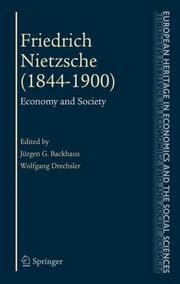
ISBN: 1280634464 9786610634460 0387329803 9780387329796 038732979X 9780387329802 Year: 2006 Publisher: New York : Springer,
Abstract | Keywords | Export | Availability | Bookmark
 Loading...
Loading...Choose an application
- Reference Manager
- EndNote
- RefWorks (Direct export to RefWorks)
Until now, Friedrich Nietzsche’s influence on the development of modern social sciences has not been well documented. This volume reconsiders some of Nietzsche’s writings on economics and the science of state and in doing so pioneers a line of research not previously available in English. Here, twelve scholars consider Nietzsche’s historical and contemporary relevance, which has ranged from the highly serious (Schumpeter writings on creative destruction) to the pop cultural (the early works of Ayn Rand). Several papers present strong evidence of Nietzsche as an influencer of modern economists; others see him more as an influencer of influencers; and one sees little influence at all. Most of the contributions refer extensively to works previous unpublished (or poorly translated) in English. The editors do not intend to present a thorough overview or definitive description of Nietzsche’s place in economics. Rather, they hope to initiate conversations and research that explore the role this much misunderstood philosopher/cultural critic may have played, or perhaps should play, in the history of economic thought.
Economics --- Nietzsche, Friedrich Wilhelm, --- Influence --- Nietzsche, Friedrich --- Nietzsche, Friederich --- 330.45 --- AA / International- internationaal --- Socialisten en interventionisten, christelijke sociale figuren kenmerkend voor de XIXe eeuw --- Nietzsche, Friedrich Wilhelm --- Economic theory. --- Economic history. --- Economic Theory/Quantitative Economics/Mathematical Methods. --- History of Economic Thought/Methodology. --- Economic conditions --- History, Economic --- Economic theory --- Political economy --- Social sciences --- Economic man
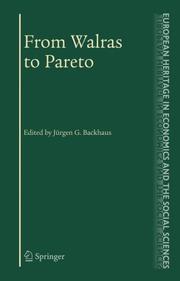
ISBN: 1280724390 9786610724390 0387337571 0387337563 1441941479 Year: 2006 Publisher: New York, N.Y. : Springer,
Abstract | Keywords | Export | Availability | Bookmark
 Loading...
Loading...Choose an application
- Reference Manager
- EndNote
- RefWorks (Direct export to RefWorks)
One may have various reasons for compiling a volume of papers devoted to and inspired by Walras and Pareto. Pareto succeeded Walras in 1893 on the chair of Political Economy at the University of Lausanne. The relation between the two was not always without tensions, although Pareto, on the occasion of his 25 years jubilee celebration, at least in part, transferred the honours offered to him to Walras. Indeed, one may say that to a substantial extent important parts of the works of Pareto would not have been possible without the insights of Walras. Both eminent scientists also have in common that the image of their inheritance professed to the common university trained economic scholars ('cutes') is a highly restricted caricature of the fullnes of their essential insights and contributions, and students of sociology or politicology may even finish their academic studies without ever having heard the name of Pareto. What cutes "know" about Walras amounts to the following caricature. Walras developed the general economic equilibrium model, but did not care about uniqueness and stability of an equilibrium. It is a model with exchange and production only and it assumes an auctioneer who announces price vectors to establish the equilibrium. The model presupposes perfect information and is static and certainly not dynamic. Walras had a bias towards free competition and laisser faire and neglected monopoly and taxation. Pareto is known by the cutes as the founding father of welfare economics. At best one is informed the notions of Pareto-optimality conditions and the first and second welfare theorems. But welfare economics is in general disappearing from the university research and teaching programs, replaced as it is by consumer and producer surpluses in the nowadays flourishing partial industrial economics programs. In this thought-provoking collection, ten international scholars offer reflections and new interpretations of Walras’and Pareto’s unique contributions to topics as broad as the over-arching important of the social sciences, the development of modern microeconomics and (in particular) econometrics, political economy and public choice, and political sociology. Their insights will be of particular interest to researchers and scholars of economic history, political sociology, and the social sciences.
Equilibrium (Economics) --- Welfare economics. --- Walras, Léon, --- Pareto, Vilfredo, --- Economic policy --- Economics --- Social policy --- DGE (Economics) --- Disequilibrium (Economics) --- DSGE (Economics) --- Dynamic stochastic general equilibrium (Economics) --- Economic equilibrium --- General equilibrium (Economics) --- Partial equilibrium (Economics) --- SDGE (Economic theory) --- Statics and dynamics (Social sciences) --- Walras, Marie Esprit Léon, --- Economics. --- Macroeconomics. --- Economic history. --- Economics, general. --- Macroeconomics/Monetary Economics//Financial Economics. --- History of Economic Thought/Methodology. --- Economic conditions --- History, Economic --- Economic theory --- Political economy --- Social sciences --- Economic man --- Management science. --- Quantitative business analysis --- Management --- Problem solving --- Operations research --- Statistical decision --- Walras, Leon,
| Listing 1 - 10 of 21 | << page >> |
Sort by
|

 Search
Search Feedback
Feedback About UniCat
About UniCat  Help
Help News
News